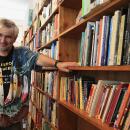Fear and Trembling
- Share via
You’re not a writer until you’ve written something it would hurt to get hit over the head with. Jan. 17, Southern California put this handy little rule of thumb to the test, when at 4:31 a.m., bookshelves all over L.A. pitched out their contents and then lurched right after them, as if reconsidering. In an apparent victory for Tru-Valu over Ikea, homemade cinder-block-and-plank shelves seem to have fared better than store-bought bookcases. At our house, the lower blocks functioned almost like gimbals, giving just enough to absorb the shock. Unfortunately, the upper blocks functioned like cannonballs. If, like mine, your housekeeping life is dedicated to the twin propositions that 1) no pile is so precarious it can’t be stabilized by another object placed atop it just so, and 2) ceilings make the best paperweights, your lot was grief.
Book collector John Krisilas has lived in the same Northridge house since he built it in 1957. A week after the quake, the retired spacecraft engineer’s library still has “two rooms that I can’t even get into because everything has fallen and blocked the doors.”
“I’m a bookaholic. I collect T.E. Lawrence, and the English limited edition looks like it came through all right. I have a couple of Picasso-signed books, and they’re buried. It’s just a crapshoot, just like the earthquake is. I will not buy another book for the rest of my life.” Won’t it be difficult for a confessed bookaholic to go cold turkey? “Alcoholics do it, right?”
Away from the epicenter, L.A. Reader publisher James Vowell has a story that must make John Krisalis weep. Like so many of us, Vowell is a book collector only by default. “I don’t think I’ve ever thrown a book away in my life. I probably have every textbook I ever used. A Miracle Mile resident, Vowell took precautions after the Whittier Narrows quake. “All I did after Whittier was get these little screen-door hooks, which I put it in the center of each bookcase. They’re 50-cent items at a hardware store. I don’t think there’s a single book on the floor.”
But before every bibliolater in the greater metropolitan area races out to the corner store, Vowell has another cautionary tale from the quake. “I have a friend in Woodland Hills who had three double-width bookshelves filled with books. I’m not sure how, but he had attached them to the walls. The bookcases came down, and so did all of the Sheetrock. He’s got exposed 4-by-4 walls now. Who can tell?” But will Vowell put what he’s learned at home into practice at the Reader, where a number of bookcases toppled? “Damn tootin’.”
Bibliophile Joanne Bernstein’s Sunland collection escaped serious damage. “We weren’t that hard hit. The expensive books didn’t happen to be on the top shelves. The ones on the top shelves get the worst beating.” A former president of the Southern California Book Collector’s Club, was she putting the more valuable ones on the lower shelves with that in mind? “Well, I certainly am from now on.”
Ed Todd’s collection of books printed before 1500 may owe their quake-resistance to a similar combination of minor preparation and geographic luck. “My rare books are on very deep shelves, the heavy ones at the bottom. The chimney fell off and damaged part of the roof, but internally, I’m all right.” Given the choice between his chimney and his incunabula, “I would certainly sacrifice the chimney.”
A member of both the Book Collectors and the redoubtable Zamorano Club, Todd’s most prized book is “probably a Bible from 1250, 1260, something like that,” but don’t look for it under his chimney bricks. “A lot of my things are at UCLA, some at USC, some at Huntington. I don’t worry about them there.”
For those of us in whose library-book-sale first editions the Huntington has thus far evinced little interest, Ed Todd has this advice: “Keep deep shelves for your good books. It’s the ones on the edge that fall off.”
For all of us “on the edge” here, there’s a large antiquarian book fair coming up in near the airport, but John Krisalis has “made a vow not to go.” A moment later, though, he’s making tentative plans to meet a reporter there, and grousing about “people like Joyce Carol Oates and John Updike--they never stop writing! I’m going to stop (collecting them) first.”
Doesn’t that imply there are other writers whom he’ll keep collecting, at least for a while? Krisilas’ laugh is rusty. “You’re probably right, but I’m not going to agree with you.”
More to Read
Sign up for our Book Club newsletter
Get the latest news, events and more from the Los Angeles Times Book Club, and help us get L.A. reading and talking.
You may occasionally receive promotional content from the Los Angeles Times.











